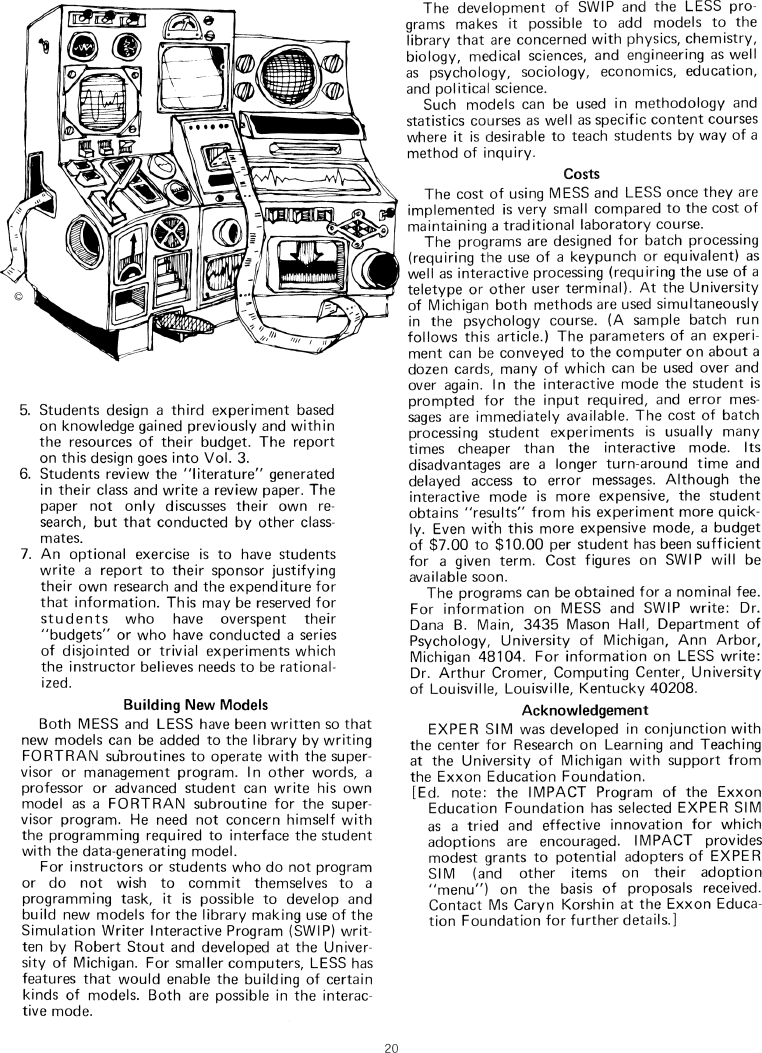The Best of Creative Computing Volume 1 (published 1976)
Exper Sim: Experimental Simulation

5. Students design a third experiment based
on knowledge gained previously and within
the resources of their budget. The report
on this design goes into Vol. 3.
6. Students review the "literature" generated
in their class and write a review paper. The
paper not only discusses their own research, but that conducted by other
classmates.
7. An optional exercise is to have students
write a report to their sponsor justifying
their own research and the expenditure for
that information. This may be reserved for
students who have overspent their
"budgets" or who have conducted a series
of disjointed or trivial experiments which
the instructor believes needs to be rationalized.
***
Building New Models
Both MESS and LESS have been written so that
new models can be added to the library by writing
FORTRAN subroutines to operate with the supervisor or management program. In
other words, a
professor or advanced student can write his own
model as a FORTRAN subroutine for the supervisor program. He need not concern
himself with
the programming required to interface the student with the data-generating
model.
For instructors or students who do not program
or do not wish to commit themselves to a
programming task, it is possible to develop and
build new models for the library making use of the
Simulation Writer Interactive Program (SWIP) written by Robert Stout and
developed at the University of Michigan. For smaller computers, LESS has
features that would enable the building of certain
kinds of models. Both are possible in the interactive mode.
The development of SWIP and the LESS programs makes it possible to add models to
the
library that are concerned with physics, chemistry,
biology, medical sciences, and engineering as well
as psychology, sociology, economics, education,
and political science.
Such models can be used in methodology and
statistics courses as well as specific content courses
where it is desirable to teach students by way of a
method of inquiry.
****
Costs
The cost of using MESS and LESS once they are
implemented is very small compared to the cost of
maintaining a traditional laboratory course.
The programs are designed for batch processing
(requiring the use of a keypunch or equivalent) as
well as interactive processing (requiring the use of a
teletype or other user terminal). At the University
of Michigan both methods are used simultaneously
in the psychology course. (A sample batch run
follows this article.) The parameters of an experiment can be conveyed to the
computer on about a
dozen cards, many of which can be used over and
over again. In the interactive mode the student is
prompted for the input required, and error messages are immediately available.
The cost of batch
processing student experiments is usually many
times cheaper than the interactive mode. Its
disadvantages are a longer turn-around time and
delayed access to error messages. Although the
interactive mode is more expensive, the student
obtains "results" from his experiment more quickly. Even with this more
expensive mode, a budget
of $7.00 to $10.00 per student has been sufficient
for a given term. Cost figures on SWIP will be
available soon.
The programs can be obtained for a nominal fee.
For information on MESS and SWIP write: Dr.
Dana B. Main, 3435 Mason Hall, Department of
Psychology, University of Michigan, Ann Arbor,
Michigan 48104. For information on LESS write:
Dr. Arthur Cromer, Computing Center, University
of Louisville, Louisville, Kentucky 40208.
****
Acknowledgement
EXPER SIM was developed in conjunction with
the center for Research on Learning and Teaching
at the University of Michigan with support from
the Exxon Education Foundation.
[Ed. note: the IMPACT Program of the Exxon
Education Foundation has selected EXPER SIM
as a tried and effective innovation for which
adoptions are encouraged. IMPACT provides
modest grants to potential adopters of EXPER
SIM (and other items on their adoption
"menu") on the basis of proposals received.
Contact Ms Caryn Korshin at the Exxon Education Foundation for further details.]


